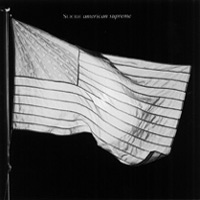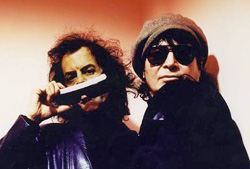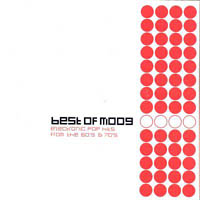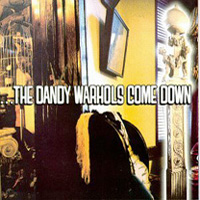 Suicide
Suicide
American Supreme (Mute)
by Lex Marburger
When you think about disappointments, you think about great artists blowing it. Like when Sting decided that there was a jazz musician inside him dying to get out (there wasn’t), or when The Chemical Brothers thought the world would follow them from innovative Big-Beat Electronica to redundant Trance-House techno (they didn’t). Not to say that musicians shouldn’t go off in new, unfamiliar directions and try stuff they’ve never thought of (Refused, Beastie Boys, The Beatles – if you want to get into it, we can [email me], but just follow me for a minute while I lay this out), but they’ve got to keep some core principals, else the product suffers. Which brings us to Suicide. What’s that? The core is still there, you say? Still just Martin Rev & Alan Vega, just a synth and a voice? I didn’t say core elements, I said core principals. It doesn’t matter if The Who still had a drummer on Face Dances, it just wasn’t the same. Look at Tom Waits’ albums: All of them sound different, but there is some certain feeling that ties them all together (and it’s not just Tom’s voice, smart ass).
 What we have here on American Supreme is an excess of technology getting in the way of performance. Way back when, Suicide didn’t have much to go on. A crappy drum machine, a Farfisa organ, a mic and attitude. Attitude they had in spades. Their on-the-edge, creepy, stark, unsettling songs did, as they say, launch the “synthpop” movement (can’t forget Throbbing Gristle & Cabaret Voltaire, tho’), but the taggers-on smoothed out the music, and prettied it up (let’s just say that Suicide would easily with Erasure, and leave it at that). Much of that roughness was a direct result of their lack of equipment and technical knowledge. So what happens to that mix 20 years later? Well, it’s gotten really easy to program a computer, that’s what. American Supreme sounds like the rest of these synth/industrial bands, uninteresting loops, and a slightly pissed-off ranter up front, light delay on the vocals, saying things like “I am the death machine” (from the track, not surprisingly, “Death Machine”). The attitude vanishes under the gloss of sequencers and slick production, the notable exception being “Dachau, Disney, Disco,” which throws around enough shards of chaos to evoke some sort of visceral reaction.
What we have here on American Supreme is an excess of technology getting in the way of performance. Way back when, Suicide didn’t have much to go on. A crappy drum machine, a Farfisa organ, a mic and attitude. Attitude they had in spades. Their on-the-edge, creepy, stark, unsettling songs did, as they say, launch the “synthpop” movement (can’t forget Throbbing Gristle & Cabaret Voltaire, tho’), but the taggers-on smoothed out the music, and prettied it up (let’s just say that Suicide would easily with Erasure, and leave it at that). Much of that roughness was a direct result of their lack of equipment and technical knowledge. So what happens to that mix 20 years later? Well, it’s gotten really easy to program a computer, that’s what. American Supreme sounds like the rest of these synth/industrial bands, uninteresting loops, and a slightly pissed-off ranter up front, light delay on the vocals, saying things like “I am the death machine” (from the track, not surprisingly, “Death Machine”). The attitude vanishes under the gloss of sequencers and slick production, the notable exception being “Dachau, Disney, Disco,” which throws around enough shards of chaos to evoke some sort of visceral reaction.
I’m not saying that Suicide needs to stay the same & sound like they did in 1978. Everyone’s gotta change. But I have to say that it seems to be Suicide who’s not changing very much. What they did 20 years ago doesn’t translate on new machines. They need new approaches & techniques to their music if they want to achieve the same violent emotional explosions they used to. I’d like to mention a few bands that did in fact make it through the technological chasm while maintaining their focus and their strengths: Wire, Pigface, Chris & Cosey. And that’s that.
(www.mute.com)



